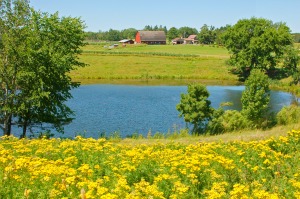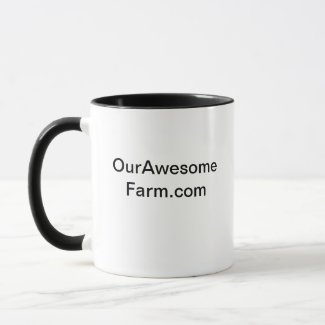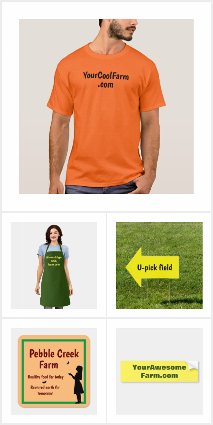The farm business plan: Tips, how-tos & free resources

Copyright National Lilac Publishing, LLC
Wondering how to start a small farm? Restructuring an established eco-farm?
Aspiring and existing farming communities can both have good reasons to write business plans.
But writing business plans for the urban farm or rural small farm, is different than writing one for the conventional larger farm business plan. This article gives the steps it takes for writing business plans specifically for those involved in small farming. It may also be applicable to other home based business and micro enterprises.
The farm business plan is a remarkable tool that focuses your energy and resources. It's like a customized, personalized roadmap that points to success and helps you see kinks and minor problems upfront so you can work them out on paper before plunging in. Farm business plans can re-organize, revitalize and help those already established in micro farming and small farming to clear the cobwebs, progress and expand their bottom line. And sometimes, farm business plans are needed to secure a farm grant or loan money for the farm venture
Step 1. Write business plans for specific audiences.
Decide upfront if the farm business plan is meant to create a personal roadmap to start a small farm, to add a new business segment to a current small farming enterprise (such as to add an agritourism element to a current market garden), or to convince a grant or loan service to offer funds for the farming venture. People can write business plans for more than one reason.
For example, someone aspiring to start a small farm may want their own farm business plan to direct their own personal activity, and then a customized offshoot of that original farm business plan to present to grant or loan services. Some may even want an extra farm business plan written just to show extended friends and family what they're doing and to convince them to support the enterprise.
Step 2. Look over free sample business plans
Once the target of the farm business plan (or plans) is understood and clear in your mind, read free sample business plans as a way to ignite the deeper understanding for writing business plans. It can be overwhelming to see many examples without a clear vision first of your own farm business plan needs in your mind.
But once you have that target for your farm business plan, as you look over free sample business plans, your mind will automatically start to edit what is and isn't appropriate for yours. Free sample business plans are rare for micro eco-farms. Most are for larger conventional agribusiness. Because of this, be sure to look over free sample business plans for various similar micro enterprises, small home businesses, and especially any home based food business plans you can find.
Go ahead and look over the occasional conventional farm business plan as well. The combination of conventional farm business plans along with home business and micro enterprise plans will give you a good education and foundation for writing your own.
Links and Searches for free sample business plans include:
- BPlans
has many free sample business plans to look over including those from
actual farms. There are also plans for healing centers and small food
manufacturing that might be somewhat akin to an agritourism farm
business plan or a value-added farm component. They have business
products for sale there also -- but you don't have to buy anything to
see the sample business plans. (And we aren't affiliated.)
- Search
the websites of larger established agriculture schools such as Cornell
University. They periodically temporarily post small and specialty farm
business plans.
- For a huge assortment of many types of free sample business plans, look to The Business Plans Handbook (large expensive reference book, see if your public library has it or has a subscription to the online version for you to access from the library)
Step 3: Understand the differences in writing business plans for the micro farming and small farming communities vs. larger agribusiness
Every micro eco-farm, from the backyard urban farm to rural micro eco-farms (a fraction of an acre to 20+ acres) to those that overlap and enter into small farming size (20+ to 100 acres) is different. But in general, micro and small farming business plans usually call for less large-scale equipment leasing, maintenance and purchase, and less considerations for hiring large numbers of employees.
However, unlike many conventional agribusiness plans which sell one product to a single established large national or international market, the micro farm business plan must have a solid, customized marketing plan for how the micro farm will reach and deliver its diverse, unique, local, seasonal, artisan and/or specialty crops to its own community or online niche market.
Step 4: Find free or low-cost help for writing business plans
Free online tutorials for writing business plans: When it's time to actually write business plans for your small farm enterprise, free online tutorials for writing business plans are available at: SCORE.org, and at (Small Business Administration) SBA.gov.
Free direct personal assistance for writing farm business plans: Free real life one-on-one mentors for writing business plans can be found through SCORE.org. Also, sometimes your local cooperative extension can give one-on-one assistance in writing your farm business plan.
Free or low cost live classes and workshops for writing business plans: You can also check with your local cooperative extension agent, your local SBA office, or your closest community college continuing education department to see if any classes or workshops for writing business plans are coming up. Business plan writing courses through the first source would be targeted to farm business plans. Courses through the first two are sometimes free or very low cost. There may be a higher (but probably still modest) fee for courses on writing business plans via a community college.
The book, Building a Sustainable Business: a Guide to Developing a Business Plan for Farms and Rural Businesses is offered by the University of Vermont, and is described by ATTRA and SARE in this way: "helps alternative and sustainable agriculture entrepreneurs to develop profitable enterprises. Sample worksheets illustrate how real farm families set goals, researched processing alternatives, determined potential markets, and evaluated financing options. Blank worksheets help producers to develop detailed, lender-ready business plans and map out strategies to take advantage of new opportunities."
Print
copies were $17 (plus shipping and handling) at this writing, and can be
ordered at the same link below where you can also find the free online
version.
Free online PDF downloadable copies can be found at SARE Free farm business plan book.
-----
Though
there are certainly successful businesses that started out
"accidentally" or started extremely small and expanded without a
business plan, many people feel creating such a plan was key to their
eventual success.
See also our articles on how farmers find ways to fully protect and insure their farm businesses with sometimes very low yearly insurance costs:
See also our articles on how farmers find ways to fully protect and insure their farm businesses with sometimes very low (or even free) yearly insurance costs:









